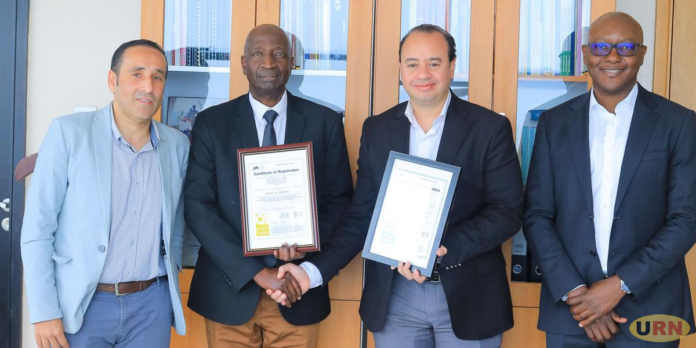By URN
gandan companies in the oil and gas sector should attain the American Petroleum Institute (API) standards certification to compete with foreign players.
The API standards cover a wide range of petroleum products, from design to manufacturing, and are of great importance for both producers and consumers.
According to the Petroleum Authority, certification not only builds industry trust but also enables organisations to compete at the highest level.
The oil and gas regulator says in the case of Uganda, the lack of such accreditation has been a barrier, limiting local companies and workers from participating more extensively in the oil and gas industry.
Since the Final Investment Decision (FID) in February 2022, the Petroleum Authority of Uganda (PAU) has approved contracts amounting to about USD 7.16 billion, of which about USD 1.8 billion (or UGX 7 trillion) has been awarded to Ugandan companies. Some of the players in Uganda have already embarked or been certified under the API.
The Petroleum Authority notes that the trend could shift significantly. Recently, E&E Experts Co. (U) Ltd, a local Ugandan company specialising in drill pipes, casing, tubing, oil and gas supplies, inspection and audit services, chemical supply, steel structure manufacturing, technical consulting, spare parts, and flange manufacturing was awarded four API certifications.
These certifications also elevate the Ugandan oil and gas industry on the global stage, enhancing its competitive advantage.
They demonstrate that Uganda’s local companies are advancing rapidly and competing favourably with international counterparts. API standards are globally recognised benchmarks that promote consistent, safe, and reliable engineering and operational practices within the oil and gas industry.
These standards ensure the safety, quality, and interchangeability of equipment and materials—ranging from drill bits to environmental protection systems.
By establishing clear guidelines, API standards help streamline operations, enhance performance, minimise risks, and ensure that materials meet internationally accepted safety and environmental protection criteria.
Ernest Rubondo, Executive Director of the Petroleum Authority of Uganda (PAU), E&E Experts’ Country Manager, Muhamed Mahmoud Raafat, emphasized the significance of the API accreditation for the company’s profile and competitiveness.
“Operational excellence, environmental compliance, and competitive advantage enable us to work globally, enhance our market competitiveness, streamline costs, and reduce operational complexity,” said Rafaat.
Rubondo praised the development, stating that it is a positive step for Uganda’s local content goals. With this accreditation, a Ugandan company can now not only serve the oil and gas industry within Uganda but also expand into the regional market, being the only local entity with the required certification. The two officers made the remarks the presentation of the certificates to E&E Experts Co. (U) Ltd.
Addressing Local Content Challenges
Many Ugandan companies have struggled to win tenders in the highly regulated oil and gas industry due to the lack of essential international certifications. As a result, non-local companies often secure contracts that could otherwise be fulfilled by Ugandan firms.
This development, according to James Musherure, Senior National Content Officer at PAU, sets a new benchmark for local companies.
“Having a certified local company will encourage other Ugandan firms to seek similar international accreditations. These standards cover everything from human resource management to operational efficiency, safety, environmental compliance, and material quality,” Musherure noted
Musherure said certifications like API are the minimum requirement for any company to earn trust and provide services in the oil and gas industry globally.
Challenges in Building Capacity
Rafaat said that t it took considerable time and effort for E&E Experts to build systems that comply with API standards.
“You need to demonstrate excellent product quality, material standards, and client satisfaction. Investing in human resource training and technical upgrades is critical to meeting industry requirements,” he added.
However, the challenge remains that few local companies or individuals in Uganda are familiar with these international standards.
E&E Experts has only one locally trained Quality Control and Quality Management expert, highlighting the need for more investment in building local capacity.
The company has established operations in Buliisa, where it supplies repair and material services to TotalEnergies E&P, COSL (CNOOC Uganda Ltd’s drilling service provider at the Kingfisher Project), and SLB, which provides drilling services for the Tilenga project.
E&E Experts is also sharing its experience with local companies to guide them on achieving international certifications like API.
Wider Implications for Uganda’s Industry
Rafaat stressed the need to extend this training beyond the oil and gas sector, reaching other industries such as manufacturing and services.
“This isn’t just an oil and gas challenge; the entire supply chain, including suppliers in other sectors, needs to meet these standards,” he said.
One of the major hurdles faced by local companies is the lack of capacity for equipment calibration and material certification.
Most Ugandan suppliers do not meet API material certification requirements, leading to the importation of materials from certified suppliers abroad. This gap can negatively impact the environment and hinder effective mitigation in case of technical challenges.
Efforts to Close the Standards Gap
The Uganda National Bureau of Standards (UNBS) is mandated to ensure that all materials supplied in the country are certified, but this has not yet been fully implemented. The oil and gas sector, however, is working to bridge this gap.
In 2020, UNBS and PAU signed a Memorandum of Understanding to develop these standards, but as PAU notes, building the necessary capacity is an ongoing process.
With E&E Experts’ certification, more local companies may now be motivated to pursue international accreditation to tap into opportunities in the oil and gas sector. However, the cost and maintenance of these certifications remain a significant challenge for many firms.
The PAU said it working with industry stakeholders to host quarterly supplier development workshops aimed at enhancing the capacity of local firms and encouraging them to obtain the necessary certifications to compete in the oil and gas sector.




